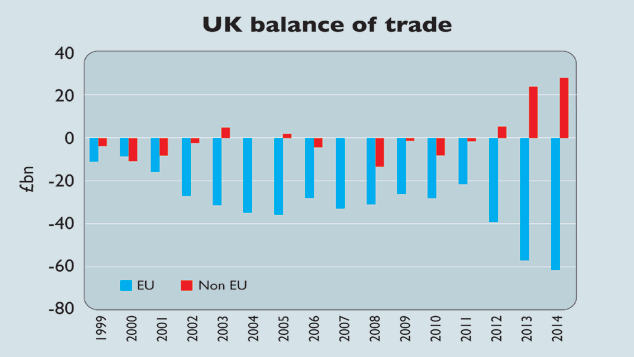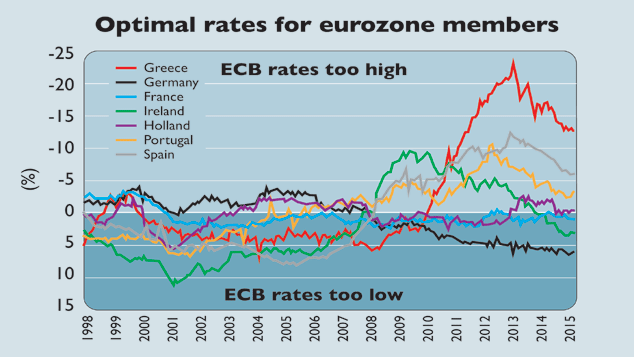The EU is the Vatican of our time – and it’s high time for a protestant revolt. Spread the word and vote leave, says Charlie Morris, editor of the Fleet Street Letter.
The polls are neck and neck, but the bookies are less certain. The odds on offer at betting exchange Betfair suggest that Britain has a 31% chance of leaving the European Union in the upcoming referendum. For those of us who believe Britain would be better off as an independent sovereign state, there’s work to do.
The EU’s economic drain on Britain
Let’s start by looking at relative performance. In 2008, there were 155 million jobs in the eurozone – today there are three million fewer. By contrast, Britain has created 1.5 million jobs, taking its total to 34 million. As a result, Britain now accounts for 18.2% of Europe’s total job market, despite accounting for just 15% of its GDP. Little surprise, then, that people want to come here.
But while it’s encouraging that Britain has created new jobs, it is disconcerting that the eurozone has destroyed them. Eight years is a long time for an economy to go backwards. The “stay” camp would argue that Britain is doing well compared to the eurozone because we were fortunate enough to have kept the pound. But it’s more than that – the failures are structural.
The failure to create jobs in the eurozone is a result of its policy choices. And this has a direct impact on Britain. Today, we have the widest current-account deficit since records began. Our trade with the EU has been a significant contributor to that – since 1999, British exports to the EU have grown by 3.6% a year, whereas our imports from the EU have grown by 4.7%. That 1.1% gap doesn’t sound like much, but compound it since 1999 and it means Britain now has a £61.2bn trade deficit with the EU, as the chart shows.
We could say that this is because British products are terrible and so no one wants our stuff. But that wouldn’t be true. Our exports to the rest of the world have grown by 6.5% a year – nearly twice the rate of our exports to the EU. And we enjoy a trade surplus with the rest of the world of £27.8bn.
The real problem is that Europe’s economy is too weak to provide a strong source of demand for our goods. This is one reason why JCB chairman Lord Bamford says that leaving the EU would be in the UK’s best interests. Inventor Sir James Dyson has also said that he would vote for Brexit, to avoid being “dominated and bullied by the Germans”. Both men run successful private companies – it’s interesting to note that the high-profile business people on the “stay” side tend to work for public companies where they oversee other people’s money.
The importance of EU trade deals has also been overstated. Switzerland has had a free trade deal with Japan since 2009, but the EU still doesn’t, despite having been in talks since 2013. Switzerland also has a deal with China, as does Iceland. So to suggest that a small country (and as the fifth or sixth biggest economy in the world, Britain is hardly that in any case) can’t negotiate on its own is plain wrong. Indeed, the EU has been held back because it tries to accommodate the concerns of each of its 28 members. It would be easier to negotiate directly, and Britain’s future trading partners would be only too happy to oblige.
Decentralisation, choice and the euro
Europe’s efforts to centralise politics further are at odds with the mood around the world. It would be better to learn from the Swiss. Political power should be disintermediated further, with a greater say for the county council and the town hall, not just in Scotland but in England’s regions, Wales and Northern Ireland too. It’s not just the EU that should be curtailed, but also Westminster and Holyrood. All countries would be better off if decision-making was more inclusive and closer to home. Yet European politics still strives to be “one size fits all”. To see how damaging this can be, you only need to look at the euro.
Here’s a statistical exercise that amply demonstrates the problem. The Taylor rule was developed to give central banks a guide to the optimal interest rate, given prevailing economic conditions. Take a look at the chart below.
In Germany right now, the rule suggests that rates should be 5.8%. In Spain, they should be –6%. In Greece, –12%. This wouldn’t be a problem if they all had their own currency – the exchange rate would take the strain. Instead, they’re all stuck with zero percent rates, whether suitable or not. That’s why we have boom in Germany and bust in Greece.
The hope is that by accepting the pain now, these differences will converge over time. But that sort of convergence takes time. There are efforts to accelerate the process via ever more stimulus, and not just from the European Central Bank’s quantitative easing programme – part of the stimulus also comes from fiscal transfers. According to Roger Bootle of Capital Economics, the British taxpayer pays 0.5% of GDP (£9bn) into the EU each year – net. If there were no EU, that money would either be spent by national governments or by private individuals. While £9bn isn’t a vast sum for Britain, we’d still have plenty of uses for it at home – more schools and hospitals, or, dare I suggest it, a tax cut.
Fear tactics
The “stay” campaign is resorting to fear tactics to convince us that big politics is best. We need to be a part of this club, they say, even though the service is terrible and the committee gets free drinks at our expense. They agree with us on our list of complaints, and say they have spoken with the committee. They assure us that the service will be improved and the committee will pay for its own drinks in future. So it’s best to remain a member. The “Britain Stronger in Europe” campaign has three main points on its website: a stronger economy, stronger leadership and stronger security.
I’d argue these are precisely the reasons we should vote to leave. It’s quite clear that our terms of trade would improve outside of the EU, and even more so were the euro dismantled, leaving a stronger Europe to emerge. Ever-closer union might achieve political unity (in name at least), but it certainly won’t boost the economy. As for stronger leadership, Britons are frustrated by our lack of influence. We are an English-speaking island nation. The EU is dominated by France and Germany – especially the latter – with Britain punching below her weight. As for stronger security, the control of our borders would be improved if the UK were free to make its own decisions, and we have no intention of leaving Nato (see below).
The reality is that these islands can thrive alone, just as they did after King Henry VIII cut ties with Rome in the 16th century. At the time, northern European nations shared a similar sentiment. Under the influence of Calvin, Luther and Zwingli, they cut ties with the Vatican, the EU of its time. The north became “protestant” (a “protest” against Rome), while the south remained loyal to Catholicism. In those days, the south was rich and the north was poor. How things change. If you want to see Britain cut free of these shackles, now is the time to spread the word – and vote “leave”.
Would Scotland leave?
One genuine concern raised by a British exit from the European Union is that it could trigger a second referendum on Scottish independence. It would be ironic if the United Kingdom became a political island only to see new bridges with the EU being built in the north. However, other factors militate against independence. The oil price will rebound eventually, but if Scotland had turned independent in 2014 on the back of a Scottish National Party budget based on $100 a barrel oil, the country would be in a lot of financial trouble now.
And it’s hard to see the Scots seeking closer union with the EU when several other countries, not just Britain, are equally frustrated and seeking to break away. In Holland, Geert Wilders, leader of the anti-EU Dutch Freedom Party, now has more than 40% of the country behind him. He told Bloomberg: “We are not sovereign anymore; we are not even allowed to form our own immigration policy, or even close our borders, and I would do that. I would wish the Dutch to be more like Switzerland. In the heart of Europe, but not in the EU.”
According to the EU itself, the British are roughly as dissatisfied with the EU as the Czech Republic is, but less fed up than Austria, Greece and Cyprus. Whether through economic woes, anger over immigration and a lack of democracy, or frustration with regulation, the EU has managed to give everyone a reason to dislike it.
Did the EU really prevent World War III?
Another argument for staying in the EU is that it has kept the peace. But as a group of historians, including author Andrew Roberts, noted in a recent letter to The Daily Telegraph, it is Nato – which includes non-EU states, such as America and Turkey – not the EU, that has kept the peace.
Nato was founded in 1949, well before the Treaty of Rome, and continues to guarantee peace in Europe even after the disintegration of the Warsaw Pact. “Meanwhile, Germany has transformed itself from a warmongering state into a model democracy determined to atone for the horrors of the Third Reich… Only myth-makers” can claim that this peace is thanks to the EU.
It’s true that Europe has come together to work on great projects, such as the Typhoon fighter jet, the Airbus A380 aircraft and the particle accelerator at Cern. But these initiatives are independent of the EU. All they required was cross-border cooperation – which won’t change if Britain leaves. Others hail the EU for providing funding for the sciences. Yet the EU Commission recently raided more than €2bn from its Horizon 2020 research budget to pay for the problems caused by the euro.
Category: Economics



